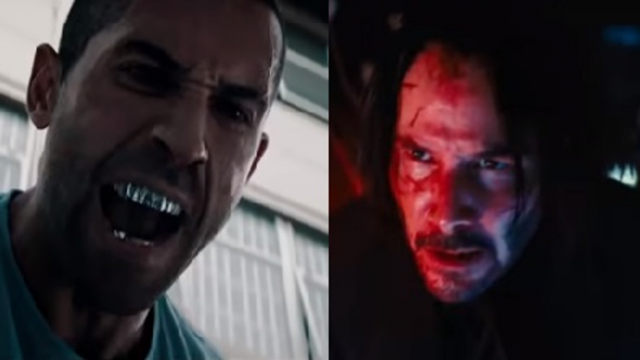Movies talk to each other. What did the films of 2019 have to say? This is a look at how two movies from the past year tackle similar subjects in different ways. Be warned, SPOILERS for John Wick: Chapter 3 – Parabellum and Avengement follow.
How far would you go for vengeance, to pay back those who hurt you? It’s a question art has asked for a long time, and that movies are particularly well-equipped to pose. Because the answer is often beside the point when the visceral bone-cracking, blood-spilling journey is the destination.
The most important scenes in John Wick, the surprise 2014 hit movie, don’t contain John Wick the character at all. One is a monologue from Michael Nyqvist, describing the man coming to kill him in the tones of a man already dead. But even that is superfluous compared to a call he gets from John Leguizamo, telling Nyqvist that his son has given Wick cause to take revenge. It is a statement of fact, a physics equation or a curse – now that Wick has been offended, blood will be spilled. Keanu Reeves’s merciless performance cashes the check this scene writes, but he is less a man here than a god or demon, the Baba Yaga of Nyqvist’s nightmares. Creatures like that can’t be appeased.
By the beginning of John Wick: Chapter 3 – Parabellum, Wick is very much a man, one trying to remove the target on his back placed at the end of John Wick: Chapter 2. Reeves adjusts his performance accordingly, showing increasing weariness throughout the movie. Wick’s exhaustion as he tries to fend off killers is one thing, but it could just as easily be tied to his navigation of the Illuminati-esque bureaucracy in the films’ universe. Here is how Wikipedia summarizes one plot segment: “In Casablanca, John meets Sofia, a former friend and the manager of the Moroccan Continental. He asks her to honor her marker by directing him to the Elder, the only person above the High Table, to request atonement for his misdeed.” Only “misdeed” and “John” are things a viewer watching the movie for the first time is familiar with.
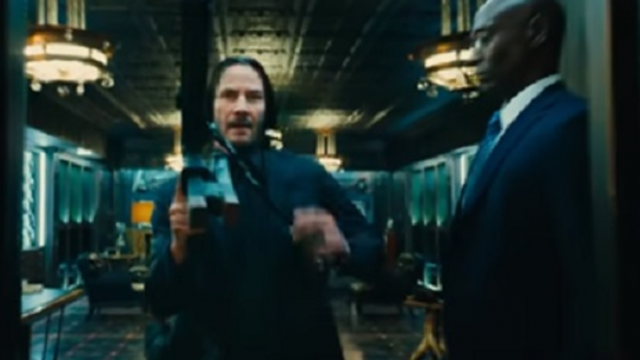
The Wick movies began with a conceit – underground society of assassins operating out of a cool hotel – haunted by Wick’s monster, a creature of vengeance unleashed by rash action and one that will not rest until it is appeased. But as they’ve progressed the conceit has become a dreaded Cinematic Universe, complete with fans debating the significance of totems and asides with all the passion and certainty of posters on a Tool fansite’s message board circa 1997 (readers can draw their own conclusions as to how a writer might be able to draw that specific analogy). It’s a confusing and tedious morass of unintended consequences. As a viewing experience it’s frustrating. As a depiction of the repercussions of vengeance it’s oddly resonant.
This extends to the violence of the movie itself. The best sequences occur early when Wick is dropped into do-or-die situations – he does, everyone else dies, and the inventiveness of the fight choreography is focused to this end. A book, a horse, a surfeit of knives are deployed with adrenaline and skill. But other, technically bravura sequences are flatter, like a lengthy scene of Wick and Sofia (Halle Berry in likely the worst performance of 2019) and two dogs tearing through an army of goons. It feels like watching someone play John Wick: The Videogame instead of seeing John Wick the man or John Wick the demigod own dudes, and a videogame character is doomed to fight over and over again with no relief. And Reeves as Wick seems to realize this. In this first movie he killed because that is what he is, here it is because that is all he is.
To make things even worse, Wick is fighting his worst enemy yet: a fan. Mark Dascascos, a staple of low-budget action, plays the ninja tasked with taking Wick down and Dascascos is both committed to his task and gushing with pleasure to be pitted against his assassin idol. His performance isn’t bad but it feels more suited to the self-aware world of the Venture Brothers. Wick initially wanted to kill the dipshits who killed his dog, doing so brought him back into the assassin world he retired from and led to old debts being called due in the second movie, and in the third chapter he’s facing off against the embodiment of everyone who watched that first movie and thought it was the shit. His quest for vengeance has expanded the universe and collapsed it in on him. There is no escape.
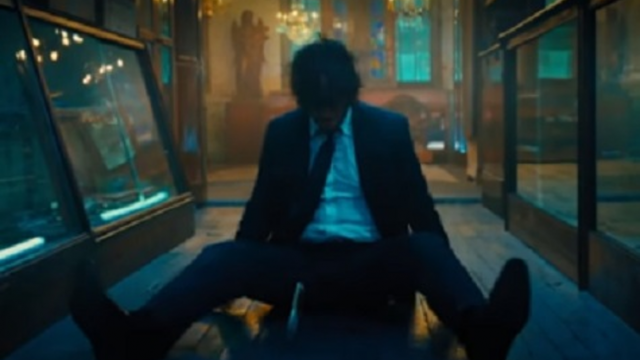
Jesse V. Johnson’s Avengement is the kind of movie that could have easily involved Dascascos, a low-budget crime flick with plenty of beatdowns. There’s no mythology and while the movie contains numerous flashbacks it is generally set in one barroom as one guy (Johnson favorite and direct-to-video action king Scott Adkins) holds a bunch of thugs hostage, telling them how they all got to this point. There’s no escape here either, but instead of Parabellum’s entropy the knotty story resolves to something simple and deadly.
Cain Burgess has been in prison for years. He’s temporarily released to see his dying mother, finds out she’s already dead, and escapes, quickly containing said thugs in said bar. Why he was in jail in the first place is cliché but unfolds smoothly – Cain fucked up a fixed fight for his brother Lincoln, a crime boss of some note, and while Lincoln refuses to give him a loan for a legitimate venture (on the admittedly smart principle of never loaning a family member money) he offers Cain a way to earn money by mugging a certain person at a certain time.
Cain fucks this up badly and winds up in the slammer, and because people think he snitched in the meantime (he didn’t) there’s a price on his head. The movie gradually teases out who put that price there and why. The who, of course, is Lincoln and the why is because Cain’s alleged snitching would expose Lincoln’s main moneymaking scheme, which is nastier than your standard loan sharking – he loans small amounts to desperate people and then “steals” that money back via muggings, leaving his clients even deeper in the hole and subject to Lincoln’s total takeover of their finances and possessions. This has happened to hundreds of people, who are now destitute or dead. As Parabellum‘s story widens it just gets more confusing, with various assassin factions bluffing and making power plays. Here the story clarifies as it pulls back, exposing more ugliness.
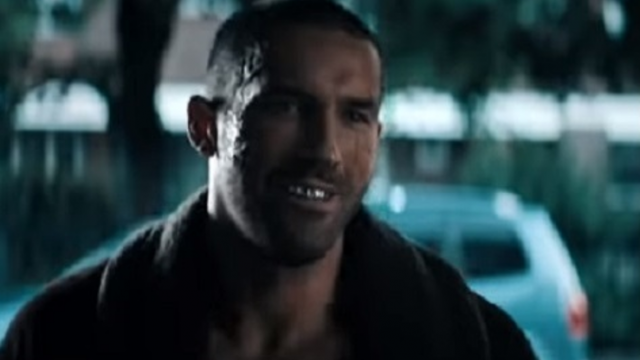
Ugliness is a running theme here. Lincoln’s gang cleans up and gets snazzier suits over the years, the better to conceal their rot, while Cain has his face burned with prison napalm, his sides stabbed with shanks, his teeth broken in a gruesome curb-stomping. If John Wick initially appears to be a god, Cain is turned into a gargoyle. But he has the anger and spite of a man, training himself in prison to have a lethal body and a “callused mind,” to become even harder and stronger and take his fights to potential attackers instead of waiting for them to make the first move.
Adkins is a phenomenal martial artist capable of grace and fluidity and the movie makes very little use of this. The fights in prison are about survival by any means necessary. John Wick is allegedly fighting in this vein as well, but he is never caged and trapped the way Cain is here, the ornate orchestrations of his fights would not work in a prison. Avengement’s brawls are thrilling in their brutality but that brutality is not soft-pedaled. Lots of movies will beat up the hero, not many will show his teeth snapping off at the gumline. Here, via a review from the great Outlaw Vern, is a director’s statement from Johnson about the movie:
“I have a very strong opinion about revenge as a reason for a story. Revenge is ugly, and will make a person ugly. It is not the practice of good people. The person obsessed with revenge does so at the cost of his friends, family, life as he knew it. It will affect his diet, his health, his wealth. If done correctly it is a commitment to murder, the darkest of all human endeavors. It is not a heroic act and when it is used as a way to create a ‘hero’ in a film, I always find it incredibly false.”
Confronted by Cain at the end of the movie, Lincoln cops to the real reason he put a bounty on his brother: For refusing to take that dive so many years ago, costing Lincoln both money and reputation. And Cain in turn reveals the purpose and method behind his escape – by keeping Lincoln and the rest of the gang occupied in the bar, Cain’s prevented them from noticing how the gang’s accountant, prompted by some strong-arming, has redirected all the embezzled/stolen money from the mugging scheme back to the people it was taken from. It’s worth considering the movie’s title here. Lincoln commits to revenge, to murder, to get back at his brother and in doing so destroys his family. Cain is also seeking vengeance but ultimately for Lincoln’s victims other than himself. He spends years preparing for his moment, and when he gets it he fights for others and his tolerance for pain in doing so is superhuman. Perhaps that makes him an avenger.
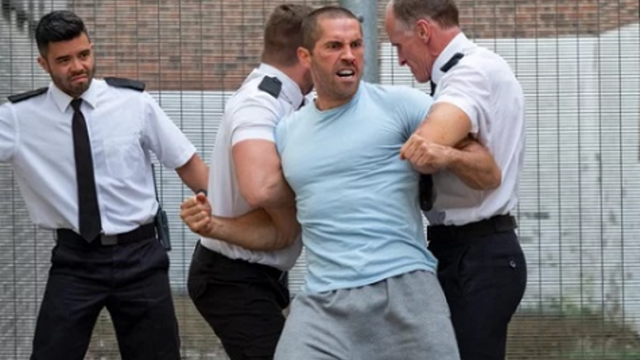
There’s no sequels in Cain’s future, though. Despite his financial setback Lincoln vows to rebuild and that can’t be allowed. Cain savagely tears through the gang, mauling if not outright killing them before gutting his older brother. Mortally wounded himself, he staggers outside and collapses, metal teeth in a smile that’s also a grimace. Cain chooses a dark path and goes down it, letting it grind and wear him down as long as it goes where he needs it to go. And he accepts that its end is also his.
After a series of betrayals (that may not be betrayals at all, as the Tool I mean John Wick fans will tell you), John Wick is shot and left for dead. But he is saved by a familiar face: a rebellious and mumbo-jumbo-spouting Lawrence Fishburne who says he’s ready to fight back against that High Table that has made their lives so difficult. Wick agrees, ready to bide his time and recover so he can seek his vengeance and thus another movie is set up. Fishburne’s presence is a riff on The Matrix of course, yet another example of the Wick franchise’s emphasis on diffusion, reference spreading out with no end in sight, and some critics noted with concern how these series are echoing each other – both start with groundbreaking original movies that could stand alone yet follow them with increasingly convoluted sequels.
Parabellum is making me think of another series though, one that also follows an Angel of Death from righteous slaughter into over-the-top ownage that nonetheless has the whiff of tedium. In Death Wish III, Charles Bronson is a man facing off against ludicrous toughs, a man not just unable to rest but who will not be allowed to rest. Tantalus was not allowed to slake his thirst and Bronson and Wick’s fury is always simmering. The Death Wish series got one more movie and it seems John Wick will see at least one more film as well, but for men like this there is always someone else to fight, it is the only way they can stay alive. In the very funny sitcom The Critic, this is taken to its logical conclusion with a trailer for the fake movie Death Wish IX. Bronson’s only line: “I wish I was dead.”

